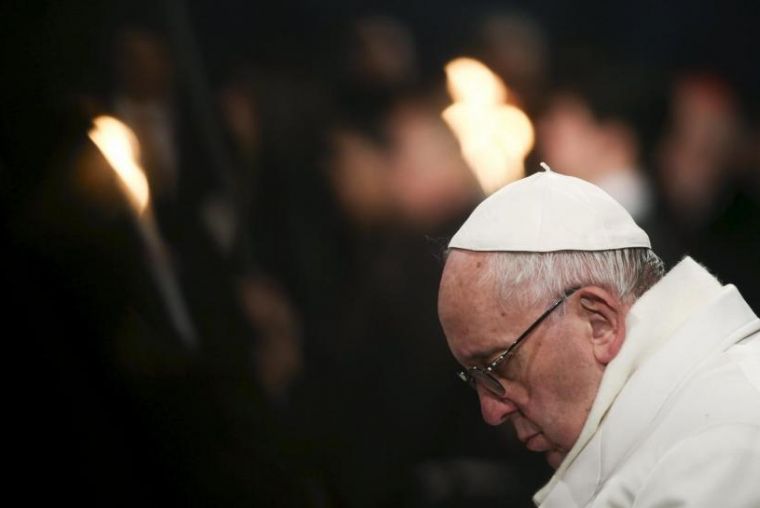Can Pope Francis do anything to help Egypt's Christians?

As war-like tremors emanate from the Korean Peninsula and the United States, a man of peace is taking a quite different message to an equally troubled nation. And despite the apparently insurmountable difficulties facing Christians in the Middle East, there are hopes he might be able to make a difference during his visit to Egypt which begins today.
Pope Francis has taken the name of a saint famous for his association with a particular prayer: 'Make me a channel of your peace.'
Blessed are the peacemakers, for they shall be called the children of God, says Jesus in the Sermon on the Mount in Matthew's gospel.
This is the message Pope Francis will take to Egypt.
It is still only weeks since 45 people were slaughtered by Islamic State in the Palm Sunday bombings in Cairo and Alexandria on Palm Sunday. The latter was at St Mark's Cathedral, where the Coptic Pope Tawadros II was celebrating Mass at the time and is thought to have been a target of the bomber.
As throughout most of the Middle East, Christians are under real threat in Egypt, a cradle of the faith, where the Alexandria Patriarchate is believed to have been founded by Saint Mark in AD 33. It is at number 21 on the Open Doors World Watch List of countries where persecution of Christians is most severe. Islamist hardliners are targeting Christians for attack. There are severe restrictions on church building. Converts from Islam and increasingly, the large Coptic minority of around 10 million – more than one tenth of the population – are being overtly and covertly attacked and discriminated against.
During 27 hours in Cairo, Pope Francis will meet Egyptian President Abdel Fattah al-Sisi, Sheikh Ahmed al-Tayeb, the Grand Imam of al-Azhar, and Pope Tawadros. And he will speak at a conference on religious dialogue at Al-Azhar in an attempt to rebuild bridges. Relations were cut in 2011 by al-Azhar, a world-leading centre of Islamic learning for over a millennium, after controversial comments by Pope Benedict about Islam.
In a video message to Egypt ahead of his visit, which begins with the Arabic greeting, As-salamu alaykum – Peace be with you – Pope Francis regrets the 'blind violence' which has been seen in Egypt recently – a reference to the Palm Sunday bombings.
He says he is coming as a friend, a messenger of peace, and a pilgrim to the country that, more than two thousand years ago, gave refuge and hospitality to the Holy Family as they fled the threats of King Herod.
He wants his visit to be 'a witness of my affection, comfort and encouragement for all the Christians of the Middle East'. It is intended as 'a message of brotherhood and reconciliation with all the children of Abraham, particularly the Muslim world, in which Egypt holds so important a place.'
He says: 'Our world needs peace, love and mercy. It needs peacemakers, people who are free and who set others free, men and women of courage who can learn from the past in order to build the future, free of every form of prejudice.'
As the Pope says, Egypt is the land where patriarchs and prophets lived. It is the land where God made his voice heard.
The tone of everything he is saying, and has said, is in contrast to the tone of comments around the situation on the Korean peninsula. In Egypt, the feel is of slow, painstaking attempts to move towards peace, not war.
It is always possible, perhaps even likely, that the Pope's visit will do little or nothing to stem the anti-Christian tide that is taking the historic faith close to extinction in the countries of its birth. For Egyptians and Muslims, the Roman Catholic Pope doesn't have the same status as he does in the West. They're more impressed by the Ecumemical Patriarch, Bartholomew, and fear encroachment by another branch of the faith in historically Orthodox territory. They've been living with the problems of the region for decades.
Yet another risky visit by the Pope, to the Central African Republic in 2015, did contribute to change. Asked to reflect on life a few months afterwards, the Archbishop Nzapalainga of Bangui said: 'Right now in my country, everyone will tell you the same thing. Be they Muslim, Protestant, Catholic, everyone! They will say the same thing: Pope Francis brought a new breath of fresh air to our country and individual lives. Before he came, we were divided into our little camps, chained to our hatreds; isolated and busy meting out the most barbaric punishment against those we considered our enemies. From the moment Pope Francis set foot on CAR, right up to today, I really can tell you that there is a different atmosphere in our land.'
Even if in the end they might be reluctant to give him the credit for any success, people of all faiths in Egypt will certainly be praying he can do the same for them.











